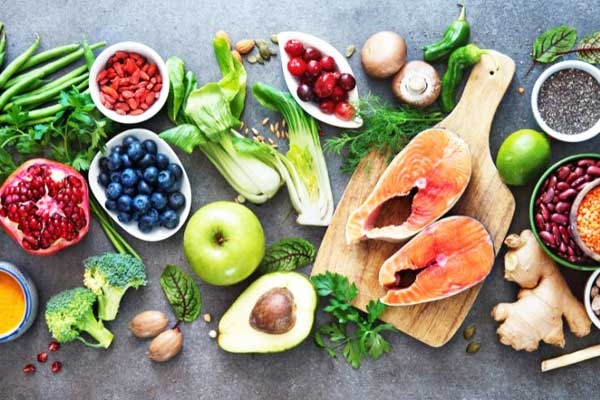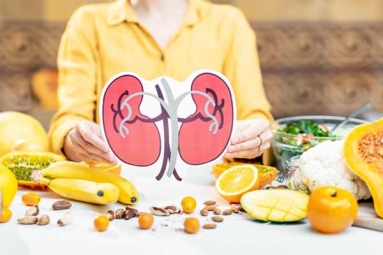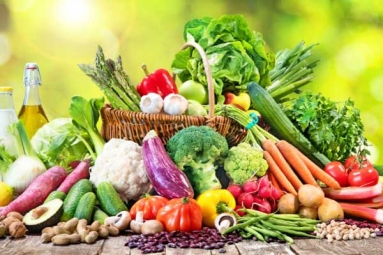
(Image source from: Canva.com)
What we eat can help or harm us. Reliance on processed foods can lead to nutritional deficiencies and diseases such as obesity, cardiovascular disease and type 2 diabetes. It doesn't have to be that way. We need to eat foods that give us energy, reduce our risk of disease and help us maintain a healthy weight. To live a longer, healthier life, you need to fuel your body with nutritious food. Natural plant-based foods give us back health and vitality.
Cruciferous Vegetables: These are a treasure trove of vegetables with the unique ability to alter human hormones, activate the body's natural detoxification system and prevent the growth of cancer cells. Cruciferous vegetables must be thoroughly chewed, minced, minced, juiced or blended to exert their powerful anti-cancer effects. Sulforaphane, a phytochemical from cruciferous vegetables, has been shown to protect blood vessel walls from inflammatory signals that can lead to heart disease. Cruciferous vegetables are the most nutrient-dense foods. Eat raw and cooked broccoli, cauliflower, Brussels sprouts, kale, cabbage, etc. every day.
Green Salad: Raw green vegetables (some in the cruciferous family) have less than 100 calories per pound, making them ideal for weight management. A scientific study found that women who ate a large salad at the start of a meal consumed fewer calories for the rest of the meal, and the large salads saved more calories than the small salads. In addition to weight control, increased consumption of salad, leafy greens, or raw vegetables has been linked to a reduced risk of heart attack, stroke, diabetes, and some cancers. In addition to folic acid, an essential B vitamin, leafy greens are also rich in the carotenoids lutein and zeaxanthin, which protect the eyes from light damage. Try kale, kale, mustard greens, spinach and lettuce. To maximize the health benefits of leafy greens, we need to maximize the intake of fat-soluble phytochemicals, particularly carotenoids, which require fat. That's why your salad (or dressing) should always contain nuts and seeds.
Nuts are a rich source of healthy fats, plant proteins, fiber, antioxidants, phytosterols and minerals. Nuts are a low glycemic food that helps reduce the overall glycemic load of your diet and has antiglycemic properties. Despite their calorie density, consuming nuts is associated with weight loss, possibly due to a reduced appetite due to heart-healthy components. Regular consumption of nuts lowers cholesterol levels and has been shown to reduce the risk of heart disease by 35%. Garnish your next salad with chopped walnuts or slivered almonds or mix raw cashews into a creamy salad dressing.
Seeds: The nutritional profile of seeds is very similar to nuts in that they provide healthy fats, minerals and antioxidants, but seeds contain more protein and are rich in minerals. Flax seeds, chia seeds and hemp seeds are rich in omega-3 fats. Flax, chia and sesame seeds are also rich in lignans, phytoestrogens that fight breast cancer. Sesame seeds are rich in calcium and vitamin E, pumpkin seeds are particularly rich in zinc. For the most nutritional value, eat nuts and seeds raw or lightly roasted. Try adding flax or chia seeds to your morning smoothie or oatmeal.
Berries: These fruits are rich in antioxidants and very good for your heart. Studies in which participants ate blueberries or strawberries daily for several weeks reported improvements in blood pressure, markers of oxidative stress, total cholesterol, and LDL cholesterol. Berries also have anti-cancer properties and are great food for your brain. There is evidence that eating berries may help prevent age-related cognitive decline. Use the tried and true traditional strawberries and blueberries or try something new like goji berries.
Pomegranate: Pomegranate is a unique fruit that contains small, crunchy and juicy seeds with a combination of sweet and sour flavors. Pomegranate's signature phytochemical, punicalagin, is the most abundant and is responsible for more than half of pomegranate juice's antioxidant activity. The secondary plant substances in pomegranates have anti-cancer, heart-protective and brain-healthy effects. Most importantly, a study of patients with severe carotid artery occlusion who drank an ounce of pomegranate juice daily for a year showed a 30 percent reduction in atherosclerotic plaques. Atherosclerotic plaques increased by 9% in the control group. In another study of older adults, those who drank pomegranate juice daily for 28 days had better memory performance than those who drank a placebo drink. Tip: To remove the edible seed core from the fruit, make a deep cut about half an inch in diameter, fold it in half, and tap the bottom with the back of a large spoon.
Beans: Eating beans and other legumes daily can help stabilize blood sugar levels, reduce appetite and prevent colon cancer. Beans, the most nutrient-dense source of starch, act as an antidiabetic and weight loss agent because they are digested slowly, reduce blood sugar spikes after eating, and suppress appetite by promoting satiety. It is also rich in soluble fiber, which helps lower cholesterol, and resistant starch, which is converted by intestinal bacteria into short-chain fatty acids, which help prevent colon cancer. Eating beans, peas or lentils twice a week reduces the risk of colon cancer by 50%. Eating legumes also has a significant preventive effect against other types of cancer. Red beans, black beans, chickpeas, lentils and peas are all delicious. So be sure to try them all and find your favorite.
Mushrooms: Regular consumption of mushrooms reduces the risk of breast cancer. Compounds that inhibit estrogen production, white mushrooms and portobello mushrooms contain aromatase inhibitors, which are particularly protective against breast cancer. Mushrooms have various useful properties. Studies on various species of mushrooms have shown anti-inflammatory effects, increasing the activity of immune cells, preventing DNA damage, slowing the growth of cancer cells, and inhibiting angiogenesis. Mushrooms should always be cooked. Raw mushrooms contain a carcinogen called agaritine, which is significantly reduced by cooking. Include regular white mushrooms in your diet and also try exotic varieties such as shiitake, oyster mushroom, mitake and reishi.
Onions and garlic: Vegetables in the Allium family, including onions, have a positive effect on the cardiovascular system and immunity and have anti-diabetic and anti-cancer properties. Increasing consumption of allium vegetables reduces the risk of stomach and prostate cancer. This vegetable is known for its organic sulfur compounds, which detoxify carcinogens, stop the growth of cancer cells, and prevent cancer progression by blocking angiogenesis. These compounds are released when crushing, crushing or chewing. Onions also contain high concentrations of health-promoting flavonoid antioxidants, which have anti-inflammatory properties and may help prevent cancer. In addition to garlic and yellow onions, try scallions, chives, shallots, and scallions.
Tomatoes: Tomatoes are rich in health-promoting nutrients including lycopene, vitamins C and E, beta-carotene and antioxidant flavanols. Lycopene provides targeted protection against prostate cancer, UV skin damage and cardiovascular diseases. Approximately 85% of the lycopene in the American diet comes from tomatoes. Cooking tomatoes increases the absorption of lycopene. One cup of ketchup contains ten times more lycopene than one cup of fresh chopped tomatoes. Also keep in mind that carotenoids like lycopene are better absorbed when taken with healthy fats. For more nutritional value, enjoy tomatoes in a salad with nuts or with a nut sauce. Tip: To avoid canned packaging that contains BPA, an endocrine disruptor, buy diced and diced tomatoes in glass bottles instead of cans.










